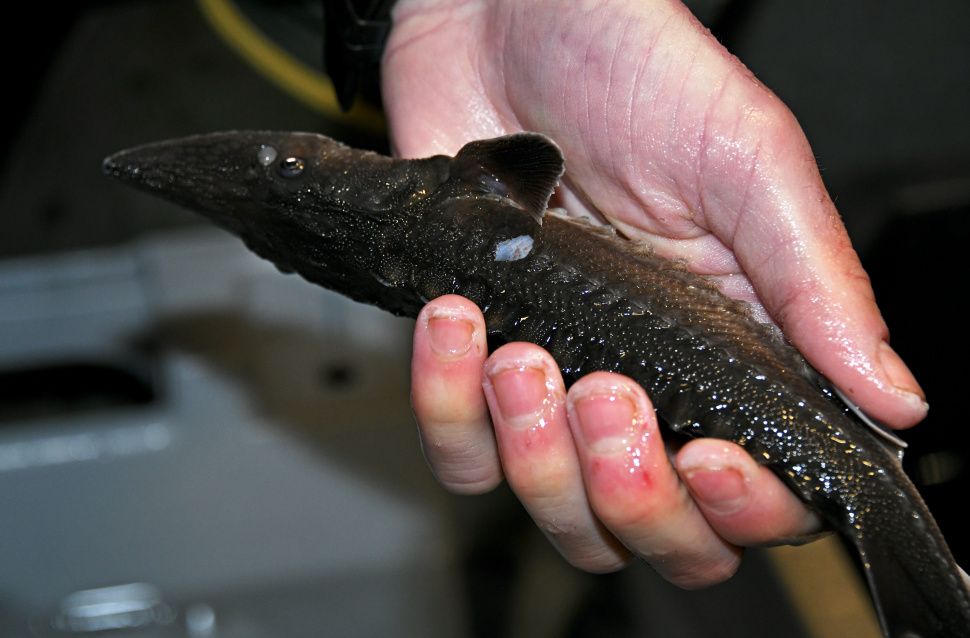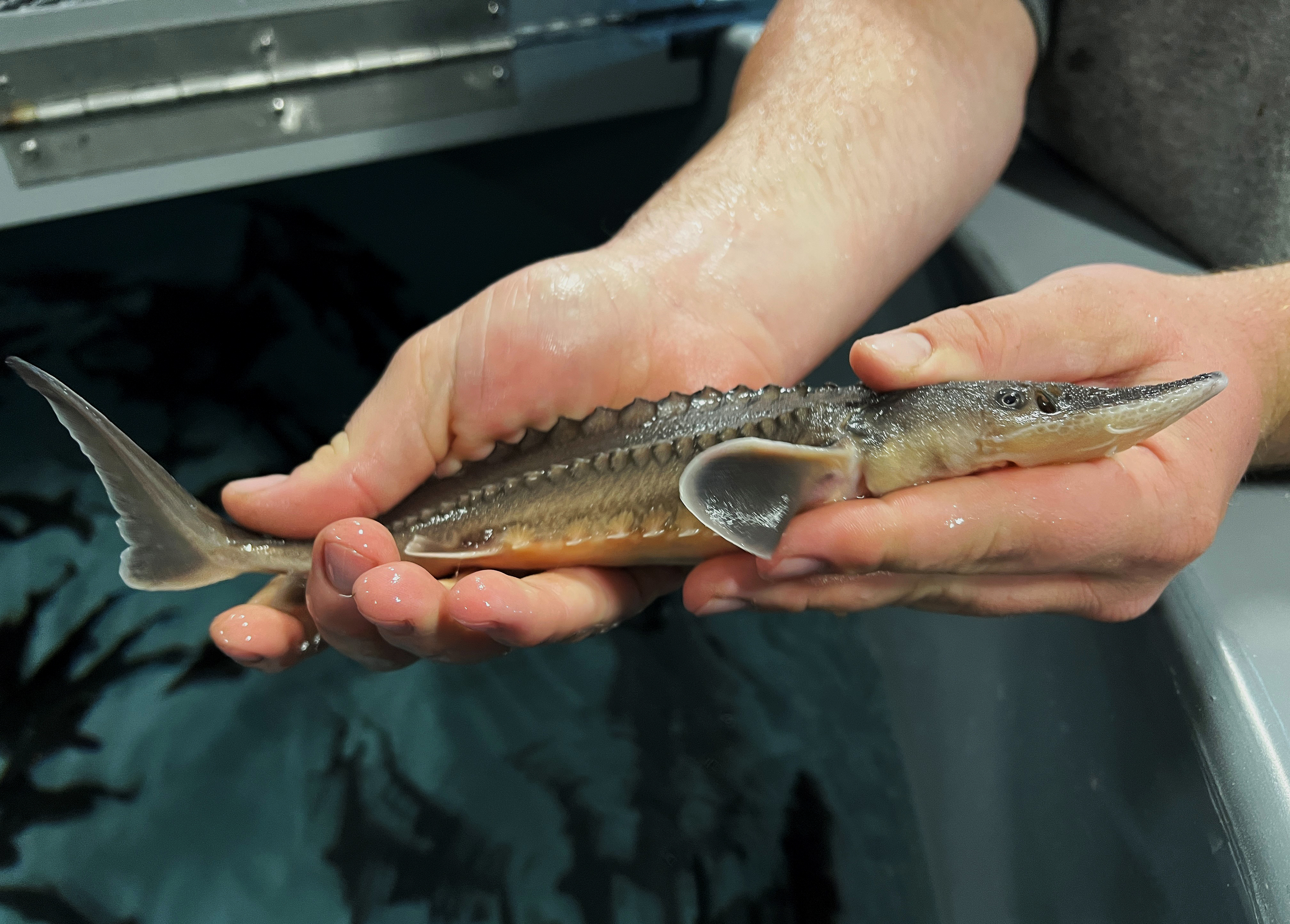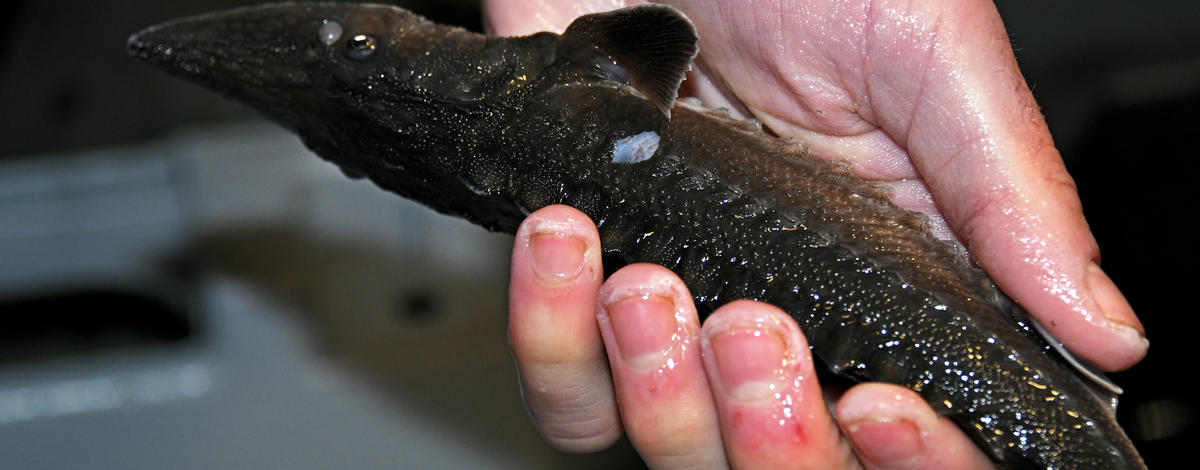The first year-class of white sturgeon reared in the new Niagara Springs Sturgeon Hatchery recently underwent genetic testing to ensure that all fish released into the Snake River are capable of reproducing. These fish are unique from a typical hatchery fish, like rainbow trout, which are typically sterile when they are stocked so they can’t successfully spawn with wild fish.
The main goal of sturgeon conservation efforts at the Niagara Springs hatchery is to ensure sturgeon populations in the Snake River are healthy and can continue to support recreational sport fishing.
Eggs for this hatchery program are collected from natural spawning sturgeon in the Snake River between Bliss Dam and CJ Strike reservoir. Once collected, the eggs are brought back to the Niagara Springs Sturgeon Hatchery where they are reared for one year.
Prior to release, all sturgeon raised at the hatchery are marked by removing a single scute, or bony plate on their side and a small PIT tag is inserted under the skin. The mark will identify the fish as having a PIT tag which will give biologists, who may handle the fish years later, information about their age, stocking date and size at stocking.

 Terry Thompson/Idaho Fish and Game
Terry Thompson/Idaho Fish and Game
A scute is removed from all hatchery sturgeon prior to stocking in the Snake River

 Rylee Olson/Idaho Fish and Game
Rylee Olson/Idaho Fish and Game
A PIT tag is inserted into a year-one sturgeon at the Niagara Springs Sturgeon Hatchery

 Terry Thompson/Idaho Fish and Game
Terry Thompson/Idaho Fish and Game
A PIT tag, or Passive Integrated Transponder prior to insertion into a sturgeon
During marking, blood is drawn from each fish that will allow biologists to determine the “ploidy”, or sets of chromosomes the fish has, which then determines if the fish is capable of reproducing or if the fish is sterile.

 Rylee Olson/Idaho Fish and Game
Rylee Olson/Idaho Fish and Game
Blood is drawn from each sturgeon to determine the number of chromosomes
Sturgeon with 8 sets of chromosomes are capable of reproducing, which helps ensure the sturgeon hatchery achieves its conservation goal. While sturgeon with 10 or 12 sets of chromosomes can still reproduce, the majority of their offspring will either be sterile or future generations of fish from these adults will be sterile.
After testing, 13 of the 1,613 fish tested had abnormal ploidy levels and were culled. Although this is a very small percentage, it is important to remove these individuals from the population given the long life span of sturgeon and the high survival rates of stocked fish in some of the Snake River reaches.
By only stocking fish with normal ploidy levels we will ensure that if these hatchery fish spawn naturally in the coming years, that their offspring will be viable, meeting the conservation goal of a healthy white sturgeon population in the Snake River.
The majority of the sturgeon will be stocked at one year of age into the Snake River after they have grown to a size of one foot or longer and weigh at least 7 ounces (200 grams).

 Terry Thompson/Idaho Fish and Game
Terry Thompson/Idaho Fish and Game
A year-old sturgeon reared in the Niagara Springs Sturgeon Hatchery
The Niagara Springs hatchery, located south of Wendell, is a partnership between Idaho Fish and Game and Idaho Power Company. The hatchery, which came online in 2021, is designed to provide additional fishing opportunity to anglers who enjoy fishing for these native fish in the middle sections of the Snake River where natural production is low, and to build sturgeon populations so that additional reaches of the Snake River will have naturally reproducing populations.
For more information contact the Magic Valley Regional Office at (208) 324-4359 or visit the Idaho Power Company website at www.idahopower.com/fish.

